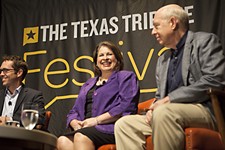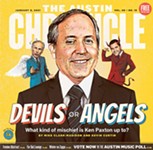Public Notice: Maybe It's Time for Formula Two
Might Bobby Epstein and COTA be starting an F1 reform movement?
By Nick Barbaro, Fri., Oct. 31, 2014

Interesting series in The Guardian this week from reporter Paul Weaver, in town from England to cover the Formula One U.S. Grand Prix. His lead-off piece Monday, "U.S. sounds warning to Formula One, a sport teetering on the brink of crisis," praised COTA's Bobby Epstein and Jason Dial, along with race ambassador and legendary driver Mario Andretti, for trying to bring much-needed reform to the sport's ruling body, the oligarchic Formula One Group, and its infamous chief executive and cave troll Bernie Ecclestone. Weaver writes that "F1 has had no coherent leadership in the past year while Ecclestone, who [turned] 84 on Tuesday, fought bribery allegations in London and Munich courts." He goes on to detail how many of the racing teams are losing big money and sponsors (see item below), due to archaic marketing ideas and fan-unfriendly technical rules (see other item below). Epstein and Dial are quoted as wanting to bring social media to bear, and to, as Epstein puts it, "make the sport about personalities. That's what Nascar does very well. Formula One can learn a lot from Nascar, from Hollywood. People connect with people. They don't connect with metal."
The failure to make some of those changes, Weaver warns in a follow-up article, is "making Formula One less popular – its TV audiences are hidden behind a pay wall, track attendances are also in decline, and sponsors are turning their back on the crisis-hit sport in increasing numbers." Yet amid the financial chaos, he notes that the Hong Kong-based private equity company CVC Capital Partners has reaped an estimated $8 billion profit from the sport since 2006. And where does that billion dollars a year come from? Well, the state of Texas ponied up $29 million of it; if Ecclestone and CVC can do that well at each of their 20 venues, they'd clear close to $600 million in public money alone.
Or conversely, if Formula One didn't have to produce a billion dollars a year in profits for Hong Kong venture capitalists, perhaps it wouldn't need $29,000,000 of our tax money, the smaller racing teams could stay afloat, and the venues could make enough money to pay their property taxes. Now that's the kind of reform we can all get behind.
As If to Illustrate Those Issues ...
Two racing teams (Caterham and Marussia) dropped out of the U.S. Grand Prix race on Saturday, and went into bankruptcy proceedings in England and Russia, respectively. That leaves nine teams and 18 cars in the starting grid for the races here and in Brazil, the smallest fields since 2005. It also dashes the hopes of the American Alexander Rossi, Marussia's reserve driver, of being the first American driver to appear in an F1 race since 2007. ... Meanwhile Sebastian Vettel – the charismatic Red Bull driver who won both the Austin race and the overall title last year – may skip Friday's warm-up and Saturday's qualifying, due to an arcane rules violation regarding too many "power units." (Indeed, Vettel and Red Bull have struggled all year with adjusting to new rules adopted for this year's cars.)
While on the Other Side of Town ...
As we go to press, the sole debate in the State Comptroller race is going on, and Dem Mike Collier is no doubt railing against that office's failure to oversee the Major Events Trust Fund (see $29M above) and the Texas Enterprise Fund (see Richard Whittaker's "Money for Nothing," Oct. 31, 2014), among other things. I love Leticia Van de Putte and the race she's run against our cover boy (see "Mask," Oct. 31, 2014), but personally, for me, Collier's been the best statewide candidate of the election cycle.
And on a Completely Unrelated Subject ...
Some of the best advice I ever got in high school was from an algebra class: "Don't waste time trying to prove something you know isn't true." So when I read the Austin American-Statesman's big front page headline, and chart, and banner, trumpeting a new COTA economic impact study showing that F1 numbers "dwarf the economic impact" of events like SXSW and ACL Fest, I was kind of waiting for the reality check. And there it was, in the very end of the story on the jump page, when reporter Gary Dinges talked to several of the businesses that actually see the most direct benefits of such events. Among the businesses, of course, the verdict was clear, and unanimous: For hotels, said Marriott sales director Jay Spurr, "There's such demand during South by Southwest ... nothing really compares." And for restaurants and bars, F1 has been "a great experience," but SXSW is "more profitable" – with the one stab at quantitative comparison putting the sales bump from SXSW as six times as large as that from F1.
(Caveat: I'm a co-director of SXSW, so maybe I'm biased – if you've spent time in town during F1 and during SXSW, judge for yourself.)
Send gossip, dirt, obscure statistics, and other useful grist to nbarbaro@austinchronicle.com.
Got something to say on the subject? Send a letter to the editor.










